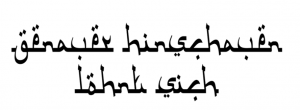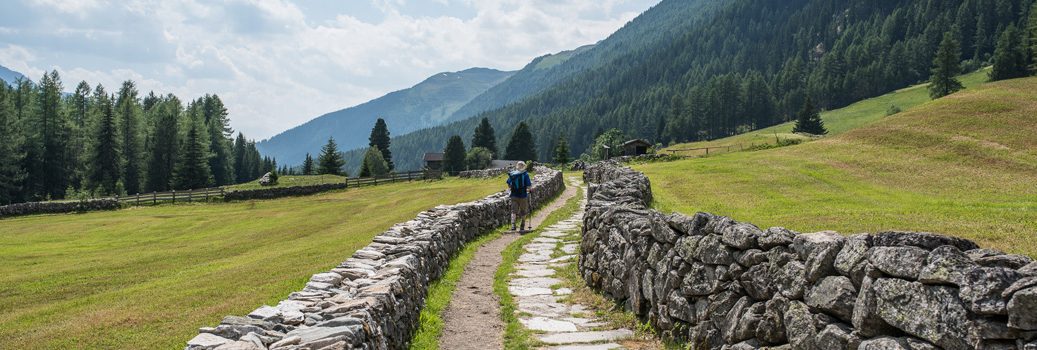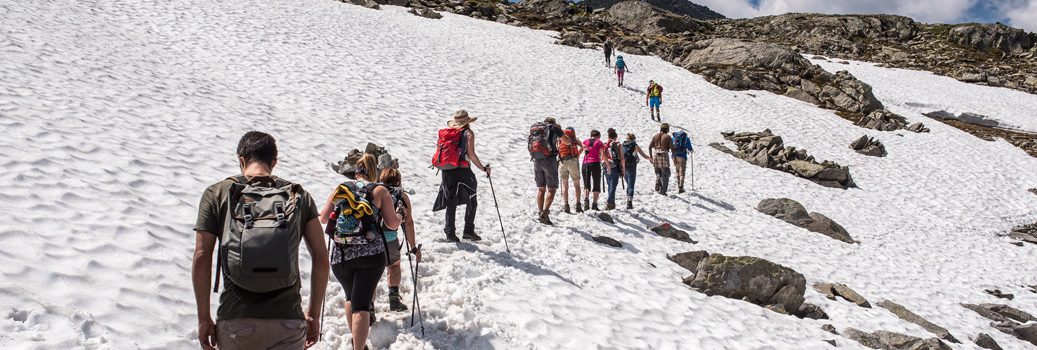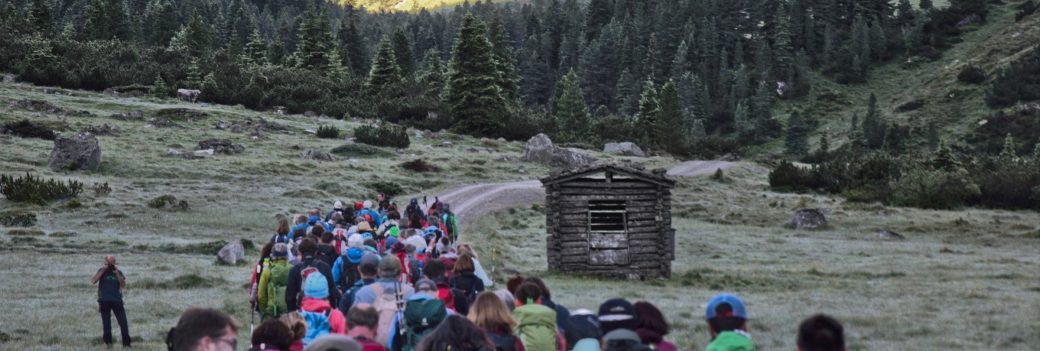For six years now, we, the association for critical education “Kontra.Punkt”, have been trying to convey critical educational contents regarding migration, flight, asylum and racism with our school workshop “Genauer Hinschauen” (“Looking Closer”) in various educational institutions in order to prevent stereotypes, respectively to make them visible and to invalidate them. In the following, we want to share our theoretical reflections on anti-racist critical education as well as the practical implementation of these ideas.
A review by Gregor Berger and Laura Bäumel. Translated by Hilde Mayer

This lettering is written in a font that may be unfamiliar to you, but not in a font you don’t understand – it’s worth taking a closer look! ©Verein Kontra.Punkt
A theory of critical education
The contents, as well as our teaching methods, claim to enable a critical and emancipative education. Critical education can mean many things, a fact that can be seen in the various theoretical treatises and the long history of this educational concept. In our opinion, however, two main axes of aspiration can be identified: The first is to teach critical content. This means to discuss topics that capitalist society saves with mechanisms of concealment, suppression, fading out, and blinding in order to maintain its own fiction (keyword “Europe of human rights”) or inverts them in such a way that they can be instrumentalized for its own narrative. These are socially critical topics that are often neglected in the curricula of educational institutions due to their marginalized position in society. Discussing these topics thus holds an emancipative potential, from which an emancipative practice can grow.
On the other hand, critical educational work requires, in addition to reflection on what one is engaged with, reflection on how one engages with something. Often, engaging oneself functions as distancing oneself from what is being engaged with. One literally deals with something, one talks about something and consequently stands out by categorizing, explaining and often constructing. But we also know a second mode of engagement in which one does not talk about it, but with it. Talking to it can mean talking to someone, but also with the help of something, that is, trying out new and different realities, patterns of perception, meanings, and ultimately a different language. In this second mode, it may also be a matter of first talking about something in order to gain a view of the relevant categories, but first and foremost it is a matter of talking to someone, making experiences accessible, communicating life worlds and realities, making contexts, narratives and framings visible.
Practice: The classroom as a space for experience
The first claim of critical education, to bring alternative and undertreated content into educational institutions, was the seed of our project. In 2014, a group of people with refugee experience and young people from the Weiz area got together to get to know each other. After we observed more and more hostility, a climate of fear and anger, as well as various prejudices, rumors and stereotypes on the part of the majority of society, we decided to design a workshop for schools to counteract this. The more classes accepted the workshop offer, the clearer it became how necessary education in this area is and how effective the exchange on these topics can be.
We try to meet the second demand, for a critical form of mediation, through the structure of our workshop. By means of well-founded data, concepts, legal situations as well as socio-economic contexts are discussed and thus the phenomenon of flight and its causes are discussed in a system-critical way in an overall social context. Afterwards, the emergence and functioning of stereotypes and rumors will be explained and demonstrated by means of a playful, socio-psychological experiment, together with the young people. In addition, the topics of “fake news” and Internet hate are discussed in this section. Finally, based on the individual fate of a person with personal experience of flight, the then and now situation in the respective country of origin is discussed, what was the reason for the flight, how the flight route went and what emotional and psychological aspects are involved in a flight and arriving in a new country. Although the young people are encouraged to ask questions and express their opinions throughout the workshop, uncertainties are to be discussed, especially at the end. In doing so, they are explicitly asked to give space to fears, worries and thoughts in all bluntness and honesty and to discuss each question with objective arguments. We try to make the richness and heaviness of the content more accessible by using a humorous and relaxed style.
Realities of critical educational work
After six years of experience organizing, designing and delivering workshops, some conclusions can be drawn. Conclusions that can inform about the emancipative potential of critical education. After not charging money for our workshops in the first years, we soon realized that volunteering entailed some difficulties. First and foremost, we had to recognize that social engagement is a privilege. We also no longer wanted to pursue the ideal of volunteering because social work should have a monetary value in society and this must be demanded accordingly, since it is usually not awarded on its own. The system must not rely on unpaid social commitment. In this point, in our opinion, we also have a responsibility towards other initiatives that also cannot afford or do not want to do unpaid work. Accordingly, every hour spent on the association is now remunerated. Another important insight for us was that it is necessary for an association that does not want to exist only for self-congratulation to deal with areas that are sometimes less exciting, to get people with different expertise on board, to build communication structures and to distribute responsibilities and accountabilities.
One problem we often have to deal with is the perception of teachers that racism is not a problem at their school. The reasons given for the refusals range from “We don’t have any refugees at the school anyway”, “The topic is no longer topical” to “There is no racism at our school”. Many teachers are not aware of the importance of talking to each other about flight and racism, even if the hat (or the refugee home) is not yet on fire. In order to be able to reach these schools with our offer, we try to offer workshops at a much lower price. Nevertheless, we do not reach all of them. Here a structural problem becomes visible: Teachers are not sensitized enough regarding the topics of racism, flight, right-wing extremism, etc. The training is accordingly not adequate. Accordingly, the training is not adequate for a society that consists to a significant extent of people with experience of flight and migration and is at the same time permeated by right-wing populist mobilization attempts.
The workshop triggers many emotions in young people. On the one hand, because the topics of racism, colonialism, flight and especially the personal fates of people with refugee experience are often upsetting and may well trigger sadness or even anger. On the other hand, because young people express, represent or repeat racist resentments and thus hurt or potentially (re-)traumatize the people with refugee experience in the team. Our tried and tested strategy is to take the young people seriously in (or with) their statements, not to make what they say taboo and to discuss their words or behavior with them with a clear attitude. Often this seriousness and perception already relativize the emotion or opinion behind what is said. Although we reflect on delicate situations and questions together in the team and exchange handling techniques, we would also need means such as supervision or similar – means, however, that are denied to an association of our size.
Opportunities for reflection – such as funded supervision – are denied to an association of our size.
But the most important experience, which ultimately feeds the energy of everything we do, is the transformative power and effect of the exchange in our workshops. After almost every workshop, we are touched by the positive effects and reactions that a three-hour anti-racism workshop can bring about, and by the interest, knowledge or political awareness that emerges in the course of the workshop. Above all, talking about personal experiences of war, persecution, suffering, flight and asylum, complemented by information on flight and asylum, opens up a space of experience and resonance that makes this work so significant and effective. This finding is reflected above all in the feedback from the young people. It is thus the empathy with and understanding of other life realities and problems described at the beginning that finds its way into the classroom through the practice of critical education work and thus represents a starting point for anti-racist cooperation. It is worth taking a closer look!
Information on the authors: Laura Bäumel is studying cultural anthropology and sociology in Graz and heads the association Kontra.Punkt. Her research focuses on critical education, postcolonialism and labor. Gregor Berger studies political, economic and legal philosophy (PELP) in Graz and is a founding member of the association. His research focuses on radical theories of democracy, critique of capitalism and populism.
About the Association:
The association “Kontra.Punkt – Verein für kritische Bildung” was founded in 2019 and emerged from the anti-racism workshop concept “Genauer Hinschauen” developed in 2014. In the meantime, our workshop offerings also include topics such as climate change and activism, fashion and human rights, as well as criticism and literature, and are constantly being expanded. The association is located in Graz. Information on www.kontra-punkt.at and https://www.facebook.com/kontrapunktverein Contact: info@kontra-punkt.at]
Literature:
Belinda Kazeem-Kamiński: Engaged Pedagogy. Antidiskriminatorisches Lehren und Lernen bei bell hooks. Wien: zaglossus 2016.
Melisa Erkurt: Generation Haram. Warum Schule lernen muss, allen eine Stimme zu geben. Wien: Zsolnay 2020.








